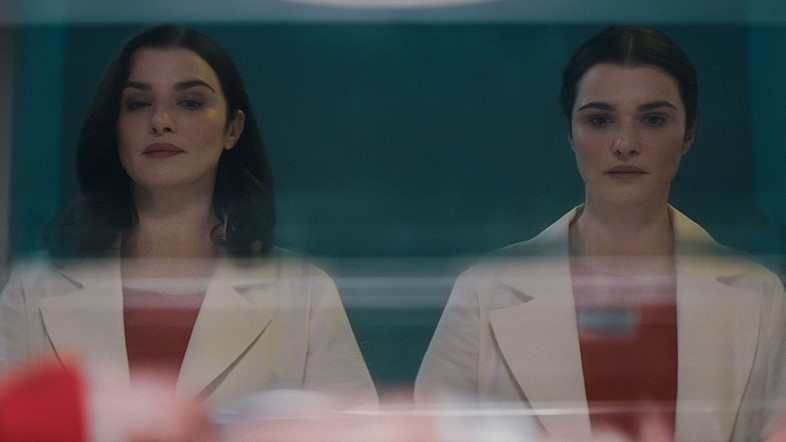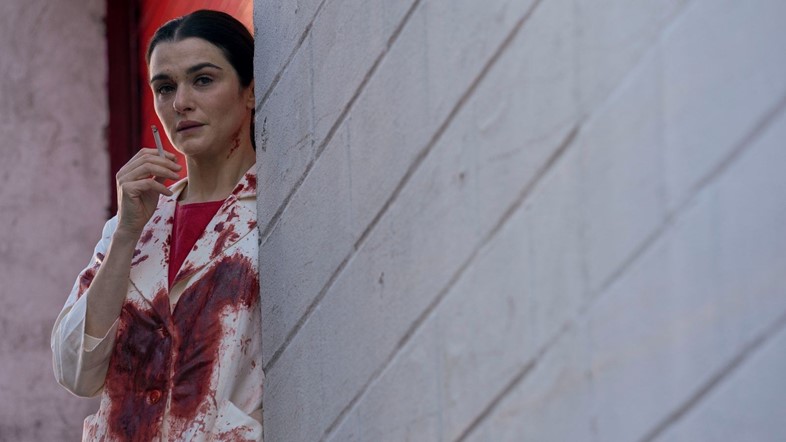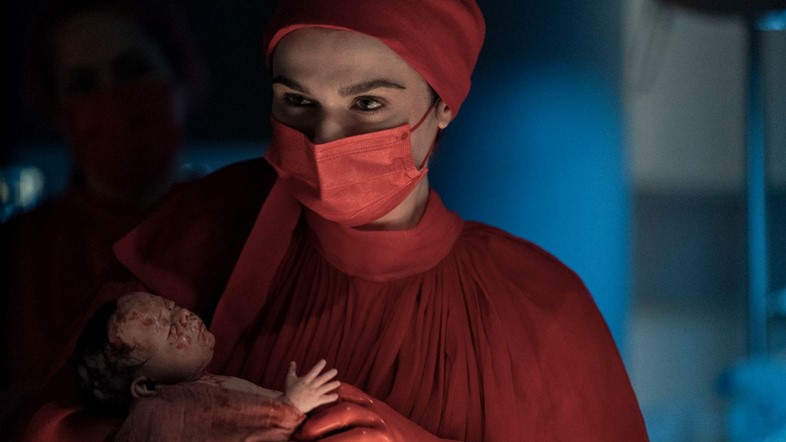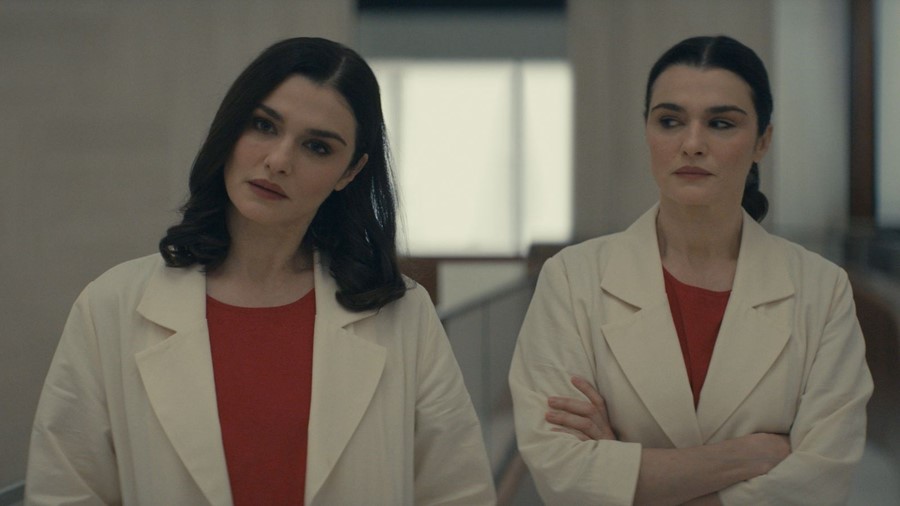AnOther spoke with Rachel Weisz and showrunner Alice Birch about the making of Dead Ringers
There are two love stories at the heart of showrunner Alice Birch’s new series. One, a ‘meet-cute’ between doctor and patient that involves one looking up the other’s vagina. The other is even more messed up than that.
Starring Rachel Weisz as a pair of gynaecologist twins with a serious case of separation anxiety, Dead Ringers is a gender-flipped take on the David Cronenberg film of the same name from 1988. It’s a terrific show, full of the weapons-grade snark and appalling behaviour that people seem to want out of their sophisticated telly nowadays – Birch was a story editor on Succession – but also moments of tenderness, too.
The story revolves around identical twins Elliot and Beverly Mantle (Weisz, pulling double duty), gynaecologists looking to fund a new cutting-edge women’s health clinic. Elliot is reckless, hedonistic and caustically funny, giving Weisz the chance to lean into the fabulously waspish, fucked-up side she revealed in The Favourite. Beverly is quiet and reserved. The pair are inseparable, but when Beverly falls for a patient (Britne Oldford) at the clinic, it threatens to upend the unhealthy co-dependency between the two sisters, with potentially devastating results.
Below, AnOther spoke with Weisz and Birch about the making of Dead Ringers.
Alex Denney: Rachel, I believe it was your idea to adapt the film into a show, are you a big Cronenberg fan?
Rachel Weisz: I’m not a proper aficionado, I just loved that one in particular. There was something about the psychological complexities between these siblings that was so bizarre and sometimes joyful, and then ultimately very dark and twisted. It fascinated me. Also I was just jealous. I thought this was a fictional world I’d like to play around in. And so I approached Alice and asked her if she was interested. I don’t think you’d seen the film at that point, right?
Alice Birch: Right.

AD: And what did you think when you saw it, Alice? Could you see the potential?
AB: I mean, it took a few watches just to kind of get over what it was, at first. It was so wild and extraordinary and so much its own thing that it was quite a frightening prospect … but in a good way. Again, I think it’s that central relationship. I felt like we could spend more time [exploring] that.
AD: Was the gender-swap aspect of the story part of the appeal for you both?
RW: I just wanted to play the part! There are things that are different because it’s been gender-flipped, like their relationship to their patients, but I don’t feel that we softened or feminised any of it; it’s just a fact [that the leading roles would be played by a woman].
AD: Is there anything about the film you didn’t like, or that you felt needed a female viewpoint as a kind of corrective?
RW: I never thought of it like that. People talk about Jeremy Irons’ performances in the film which are obviously magnificent, but I think Genevieve Bujold as Claire Niveau – the quote-unquote ‘victim’ of these two men – is one of the most powerful performances I’ve seen; it’s a really iconic performance. That’s why we called Britne’s character Genevieve, as an homage to her.
AB: Cronenberg’s film is many, many things [at once]. It made me feel all kinds of things – horrified, uncomfortable, excited – but that’s just powerful filmmaking. Really we just wanted to steal that incredible relationship, and then build our own characters and [use them to] tell a new story.

AD: One idea the show expands on is the ethics around women’s reproductive rights, and the accessibility of healthcare in general – timely issues in the US, but also in the UK, where a recent report suggested NHS waiting times for IVF treatment was harming women’s chances of having children. Were there questions you wanted to raise deliberately here?
AB: Yeah, for sure. In the writers’ room people were always bringing in stories that friends had told them about or something they’d experienced themselves; that fuelled the writing process all the time. Women’s health is an area that is massively underfunded and under-researched, and hasn’t had the same attention as men’s health. So I think it’s easy to get frustrated with that, but I suppose that’s what makes having [these characters] helpful, because it means you can have that discussion without it being like a lecture. Because it’s entertainment and so it should stay in that zone.
RW: Beverly wants to change the way that women [give] birth and she’s very into natural choices, whereas Elliot is really not interested in that line of thinking – she wants to push the boundaries of science, and she wants private funding where she won’t be told what to do by any legislative bodies. She thinks women should be able to have any choice that they want in the world, [which] Beverly doesn’t approve of. They have very different kinds of dreams to change women’s healthcare, which really puts them at odds with each other.
AD: The first episode really comes at us fast; there are graphic scenes of women giving birth as well as some very upsetting moments and also a lot of comedy.
AB: We wanted [the show] to be many things and that was a really satisfying challenge, to figure out if we could straddle a tone where one minute it’s tragic and the next it’s very funny, and then creepy or suspenseful.

AD: The Parkers are obviously a substitute for the Sacklers, the family behind America’s opioid crisis. Did you do a lot of research into the Sacklers and the way they operate?
AB: I think as soon as you say the words ‘opioid epidemic’ everybody’s gonna think of the Sacklers and so of course, you’re conscious of that as a reference. But really we looked at lots of billionaire families and talked a lot about philanthropy; in that second episode it was about trying to put Beverly in the most stressful situation possible [at a disastrous dinner party with the Parkers]. Because she really wants this money, but not from these people. And so that was a lot of fun.
AD: Rachel, you’ve become something of a hit in the gay community for your roles in Disobedience and The Favourite, and now this. Do you worry that you’re taking all the best parts for gay and bisexual women?
RW: Oh, goodness. Well, I feel very lucky that the roles I did that you just mentioned have been successful. [Lady Churchill] in The Favourite was the last, I guess, queer character. She was the queen’s lover but she was also married, so it was sort of complicated. With Beverly, if anyone is rooting for her it’s because Genevieve is offering her a family, hope, light. She offers her a way of life away from the toxic codependence she has with Elliot, and I find that very romantic; it’s a beautiful love story between Genevieve and Beverly.
Dead Ringers is available to watch on Prime Video now.
